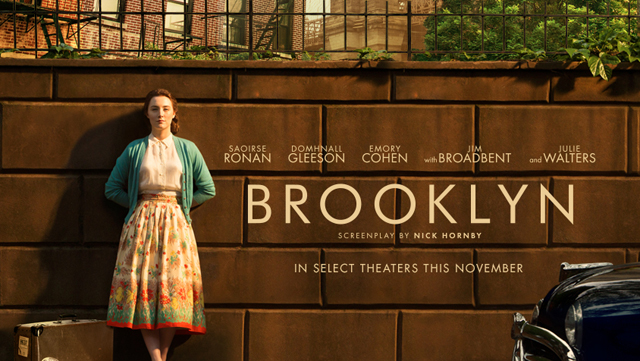
The big-screen adaption of Colm Toibín’s novel ‘Brooklyn’ would be easy to describe as heart-warming, but the storyline, acting, and intelligent script deserve more praise than that.
The simple yet powerful story begins in Enniscorthy, Co. Wexford. Irish viewers will be relieved to see that the the Irish scenes (and accents) are not dressed in inaccurate stereotypes but rather in simple, vibrant visuals.
It is not long until protagonist Eilis (Saoirse Ronan) is on her way to America through arrangements made by her sister and Brooklyn based Irish priest Father Flood.
This is where the story really gets started. Though Eilis’ heart is still in Ireland, the scenes become busier and faster paced as the backdrop of Brooklyn overwhelms the shy and confused young girl. The scenes of homesickness are heartbreakingly genuine and are one of the best examples of Ronan’s brilliantly understated acting.
One of the film’s richest gems are scenes in the house in which Eilis lodges – hardly a surprise given that Julie Walters plays landlady Mrs Keogh. The house is filled with other young women who are much giddier and cheekier than Eilis. Their scenes around the dinner table are dressed in warm humour and familiar Irishisms, something seldom portrayed in film, particularly by a cast of predominantly strong women – including Nora Jane Noonan of The Magdalene Laundries and Eve Macklin of Love/Hate.
In a scene deserving of mention, Eilis helps out at a Christmas Party for Irish emigrants. The weather-beaten hard-working faces of these nameless members of the cast is a testament to the film, specifically when one man sings Casadh an tSúgáin in perfect sean-nós style, which older Irish viewers will appreciate.
When Eilis meets a goofy yet charming young Italian man named Tony (Emory Cohen), the story changes and the romance slowly but surely improves her confidence. This leads to a gradual transition into adulthood and is perfectly highlighted through Ronan’s subtle expressions and slight variations to her costume.
Viewers will find themselves emotionally invested in Eilis’ choices throughout the film as she is faced with ultimatums under unfortunate circumstances.
From start to finish the film is a masterpiece with its array of emotions, witty lines and subtle yet powerful acting which carry the story of Toibín’s original novel perfectly, but the novel’s intense sense of being torn between two decisions is watered down, giving the ending a slightly more Hollywood feel than the unsure tragic decision in which the book ends.
Megan Roantree




Leave a Reply